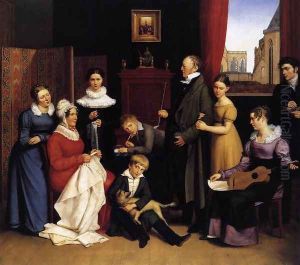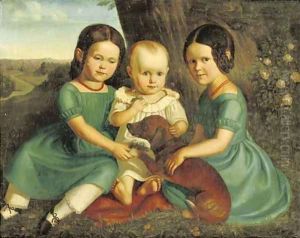Carl the Elder Begas Paintings
Carl the Elder Begas was a German painter born on September 30, 1794, in Heinsberg, near Aachen. He emerged as a significant figure in the German Romantic and Biedermeier periods, known for his portraits and religious paintings. Begas began his artistic training under Peter von Cornelius at the Düsseldorf Academy of Arts, where he developed a keen interest in the Nazarene movement, a trend that sought to revive honesty and spirituality in Christian art through Renaissance-inspired styles.
After his studies, Begas traveled extensively through Germany and Italy, which greatly influenced his artistic development. His Italian sojourn, particularly in Rome, was transformative, exposing him to the works of the Italian Masters and deepening his commitment to religious and historical subjects painted in a style reminiscent of the early Renaissance. Upon his return to Germany, Begas settled in Berlin, where he became a prominent portrait painter among the Prussian court and bourgeoisie, capturing the likenesses of notable figures of his time.
Begas's contribution to art was not limited to his own creations. He was a respected teacher and mentor, influencing the next generation of German artists. His legacy includes not only his paintings but also his role in shaping the German Romantic movement and the development of 19th-century German art. His children, notably Carl the Younger, Reinhold, Oskar, and Adalbert, followed in his footsteps, becoming accomplished artists in various disciplines, thus establishing the Begas family as an artistic dynasty in Germany.
Carl the Elder Begas's work received considerable acclaim during his lifetime. He was awarded numerous honors and became a member of art academies in Berlin and Munich. Despite the changing tastes in art and the rise of new movements, his work has retained its historical value and continues to be studied for its contribution to 19th-century European art. Begas died on November 24, 1854, in Berlin, leaving behind a rich oeuvre that continues to be celebrated for its depth, craftsmanship, and portrayal of the human spirit.

